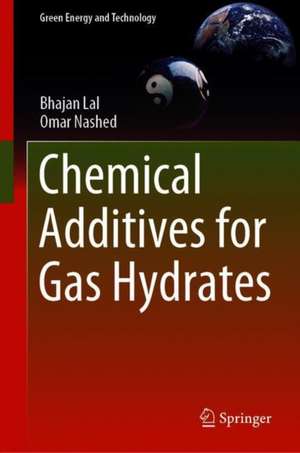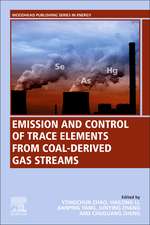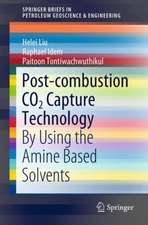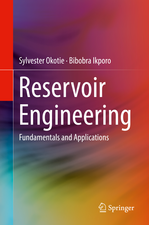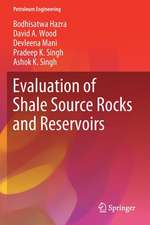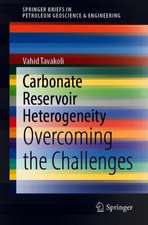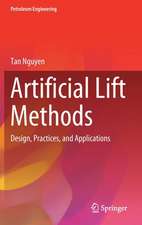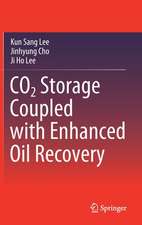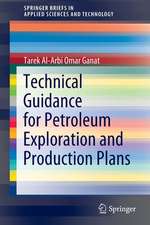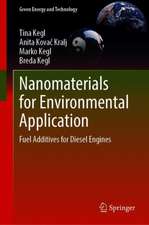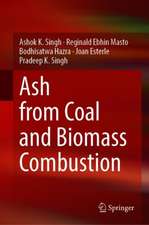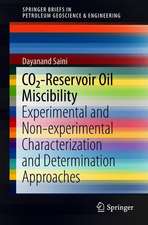Chemical Additives for Gas Hydrates: Green Energy and Technology
Autor Bhajan Lal, Omar Nasheden Limba Engleză Hardback – 15 oct 2019
The authors review not only the inhibitors used to prevent or mitigate hydrate formation, but also the conditions under which it is necessary to form hydrates quickly, which require the use of promoters. Various promoters are discussed, including their specifications, functions, advantages and disadvantages. The possibility of using natural reservoirs of gas hydrate as an energy source is also considered.
Lastly, due to the difficulty of conducting experiments that reflect all conditions and concentrations, the book presents a number of models that can predict the basic parameters in the presence of the chemicals. Given its scope, the book will be of interest to professionals working in this field inan industrial context, as well as to researchers, undergraduate and graduate students of chemical engineering.
| Toate formatele și edițiile | Preț | Express |
|---|---|---|
| Paperback (1) | 517.67 lei 6-8 săpt. | |
| Springer International Publishing – 15 oct 2020 | 517.67 lei 6-8 săpt. | |
| Hardback (1) | 636.63 lei 6-8 săpt. | |
| Springer International Publishing – 15 oct 2019 | 636.63 lei 6-8 săpt. |
Din seria Green Energy and Technology
- 18%
 Preț: 943.43 lei
Preț: 943.43 lei - 20%
 Preț: 629.52 lei
Preț: 629.52 lei - 18%
 Preț: 1124.92 lei
Preț: 1124.92 lei - 18%
 Preț: 947.35 lei
Preț: 947.35 lei - 15%
 Preț: 655.92 lei
Preț: 655.92 lei - 18%
 Preț: 957.62 lei
Preț: 957.62 lei - 18%
 Preț: 789.52 lei
Preț: 789.52 lei - 17%
 Preț: 464.56 lei
Preț: 464.56 lei - 15%
 Preț: 645.79 lei
Preț: 645.79 lei - 18%
 Preț: 903.93 lei
Preț: 903.93 lei - 24%
 Preț: 1322.09 lei
Preț: 1322.09 lei - 18%
 Preț: 890.54 lei
Preț: 890.54 lei - 18%
 Preț: 1115.46 lei
Preț: 1115.46 lei - 18%
 Preț: 1117.03 lei
Preț: 1117.03 lei - 18%
 Preț: 949.73 lei
Preț: 949.73 lei - 18%
 Preț: 892.11 lei
Preț: 892.11 lei - 15%
 Preț: 648.24 lei
Preț: 648.24 lei - 18%
 Preț: 997.09 lei
Preț: 997.09 lei - 15%
 Preț: 579.81 lei
Preț: 579.81 lei - 18%
 Preț: 1123.15 lei
Preț: 1123.15 lei - 18%
 Preț: 961.41 lei
Preț: 961.41 lei - 17%
 Preț: 490.23 lei
Preț: 490.23 lei - 18%
 Preț: 904.60 lei
Preț: 904.60 lei - 15%
 Preț: 643.34 lei
Preț: 643.34 lei -
 Preț: 287.91 lei
Preț: 287.91 lei - 24%
 Preț: 634.05 lei
Preț: 634.05 lei -
 Preț: 379.40 lei
Preț: 379.40 lei - 18%
 Preț: 783.20 lei
Preț: 783.20 lei - 18%
 Preț: 1394.84 lei
Preț: 1394.84 lei - 18%
 Preț: 1691.57 lei
Preț: 1691.57 lei - 18%
 Preț: 1112.48 lei
Preț: 1112.48 lei - 15%
 Preț: 592.61 lei
Preț: 592.61 lei - 18%
 Preț: 952.09 lei
Preț: 952.09 lei - 18%
 Preț: 944.19 lei
Preț: 944.19 lei - 18%
 Preț: 891.33 lei
Preț: 891.33 lei - 18%
 Preț: 1252.44 lei
Preț: 1252.44 lei - 18%
 Preț: 789.52 lei
Preț: 789.52 lei - 20%
 Preț: 566.30 lei
Preț: 566.30 lei - 18%
 Preț: 1113.71 lei
Preț: 1113.71 lei - 18%
 Preț: 1114.24 lei
Preț: 1114.24 lei - 24%
 Preț: 590.60 lei
Preț: 590.60 lei - 20%
 Preț: 567.50 lei
Preț: 567.50 lei - 24%
 Preț: 907.50 lei
Preț: 907.50 lei - 18%
 Preț: 952.89 lei
Preț: 952.89 lei - 18%
 Preț: 952.89 lei
Preț: 952.89 lei - 18%
 Preț: 950.52 lei
Preț: 950.52 lei
Preț: 636.63 lei
Preț vechi: 748.97 lei
-15% Nou
Puncte Express: 955
Preț estimativ în valută:
121.84€ • 126.73$ • 100.58£
121.84€ • 126.73$ • 100.58£
Carte tipărită la comandă
Livrare economică 15-29 aprilie
Preluare comenzi: 021 569.72.76
Specificații
ISBN-13: 9783030307493
ISBN-10: 3030307492
Pagini: 85
Ilustrații: X, 85 p.
Dimensiuni: 155 x 235 mm
Greutate: 0.31 kg
Ediția:1st ed. 2020
Editura: Springer International Publishing
Colecția Springer
Seria Green Energy and Technology
Locul publicării:Cham, Switzerland
ISBN-10: 3030307492
Pagini: 85
Ilustrații: X, 85 p.
Dimensiuni: 155 x 235 mm
Greutate: 0.31 kg
Ediția:1st ed. 2020
Editura: Springer International Publishing
Colecția Springer
Seria Green Energy and Technology
Locul publicării:Cham, Switzerland
Cuprins
Introduction to Gas Hydrates.- Gas Hydrates Inhibitors.- Gas Hydrates Promoters.- Gas Hydrates Models.
Notă biografică
Dr. Bhajan Lal is a senior lecturer in Chemical Engineering Department at the Universiti Teknologi PETRONAS. He is core research member of Carbon Dioxide Research Centre in Institute of Contaminant Management at UTP. After receiving his Ph.D. degree, he worked as postdoctoral research fellow and Research Scientist in USA, Canada, South Africa, Turkey, and Malaysia. His main areas of research interests are clathrate hydrates, CO2 capture and storage, natural gas storage, flow assurance (gas hydrate as well as corrosion), gas hydrate-based wastewater treatment, and water-based drilling fluid. He supervised master, Ph.D., and postdoc students since 2013. He has published 70 peer-reviewed journal papers, 38 conference papers, and 4 book chapters. In addition, as project leader, he has secured 8 gas hydrate-related research projects worth RM 2 million from oil and gas industries, UTP, and Malaysian Government.
Mr. Omar Nashed got his bachelor’s degree in Applied Chemistry at AleppoUniversity, Syria. He received his master’s degree by research in Chemical Engineering Department at the Universiti Teknologi PETRONAS, Malaysia. He is currently pursuing his Ph.D. degree by research on gas hydrate promotion for natural gas storage. Since 2012, he published 12 research articles and 3 conference papers in gas hydrate-related research areas such as flow assurance CO2 and natural gas storage, ionic liquids, and nanotechnology.
Mr. Omar Nashed got his bachelor’s degree in Applied Chemistry at AleppoUniversity, Syria. He received his master’s degree by research in Chemical Engineering Department at the Universiti Teknologi PETRONAS, Malaysia. He is currently pursuing his Ph.D. degree by research on gas hydrate promotion for natural gas storage. Since 2012, he published 12 research articles and 3 conference papers in gas hydrate-related research areas such as flow assurance CO2 and natural gas storage, ionic liquids, and nanotechnology.
Textul de pe ultima copertă
This book offers a straightforward, informative guide to the chemicals used for gas hydrate formation and inhibition, providing the reader with the latest information on the definition, structure, formation conditions, problems, and applications of gas hydrates.
The authors review not only the inhibitors used to prevent or mitigate hydrate formation, but also the conditions under which it is necessary to form hydrates quickly, which require the use of promoters. Various promoters are discussed, including their specifications, functions, advantages and disadvantages. The possibility of using natural reservoirs of gas hydrate as an energy source is also considered.
Lastly, due to the difficulty of conducting experiments that reflect all conditions and concentrations, the book presents a number of models that can predict the basic parameters in the presence of the chemicals. Given its scope, the book will be of interest to professionals working in this field inan industrial context, as well as to researchers, undergraduate and graduate students of chemical engineering.
The authors review not only the inhibitors used to prevent or mitigate hydrate formation, but also the conditions under which it is necessary to form hydrates quickly, which require the use of promoters. Various promoters are discussed, including their specifications, functions, advantages and disadvantages. The possibility of using natural reservoirs of gas hydrate as an energy source is also considered.
Lastly, due to the difficulty of conducting experiments that reflect all conditions and concentrations, the book presents a number of models that can predict the basic parameters in the presence of the chemicals. Given its scope, the book will be of interest to professionals working in this field inan industrial context, as well as to researchers, undergraduate and graduate students of chemical engineering.
Caracteristici
Presents models that can be used for various types of chemicals that either promote or inhibit gas hydrate formation Provides practitioners with solutions to related industrial problems Details the latest chemicals and offers a roadmap for the future
